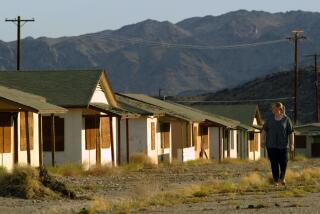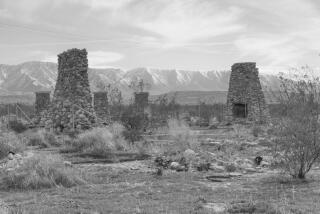A Company Town Changes Companies : Mining: The sale of Trona’s major employer has brought anxiety--and hope--to the Mojave Desert town.
- Share via
TRONA, Calif. — Minerals brought life to this scorched corner of the Mojave Desert more than a century ago, and a string of prospectors have clutched the fate of tiny Trona in their fists since.
Wedged in a wind-swept bowl hugged by three rugged mountain ranges, Trona is the classic company town, its destiny written by corporate outsiders who come to tap the bounty hidden beneath the chalky crust of Searles Dry Lake.
A forest of smokestacks from three mineral processing plants makes up the local skyline, and close to one-third of the 3,500 townsfolk work for “the company.” Many of the others used to.
Last week, a rare visitor rolled into Trona--change. On Dec. 3 at 4:05 a.m., Kerr-McGee Corp. concluded the $210-million sale of the plants, railroad and vast mineral reserves that made up its soda products division.
The move spawned a good bit of anxiety here, about layoffs, production cuts and the buyer’s ideas of civic benevolence. But, more than anything, it sent a flutter of hope through Trona--hope that an inspired new patriarch might help revive the withering town before it becomes a historical footnote.
“We’re optimistic,” said Pat McGlothlin, owner of the local hardware store and chairwoman of the Trona Pride Committee. “Because, let’s face it, the place can’t get any worse.”
During the mining industry’s boom days, one-company towns were common fixtures throughout the remote reaches of California, Nevada and Arizona. Today, however, the West is littered with their carcasses; faded signs, rusted equipment and weather-beaten shacks provide the only evidence of better days.
Tronans are aware of such history, and some worry that the worst may someday befall their town. But for now, they see cause for comfort: Although Kerr-McGee--an Oklahoma-based conglomerate specializing in oil and natural gas production--displayed what some described as an absentee landlord’s interest in developing its Trona operation, the new owner, North American Chemical Co., has an ambitious agenda.
A team of specialists has already been assembled to develop a long-range plan for the company, and its scientists are researching new uses for the wealth of chemicals mined from the dry lake.
“Our goal is to build a billion-dollar company by 1997,” North American’s chairman, D. George Harris, told community leaders at a recent dinner meeting. “We have a lot of ideas and a lot of specific projects in mind. . . . You can be sure we didn’t come here to stand still.”
Tronans say that all sounds well and good, but a whisker of skepticism tempers their enthusiasm. After all, trusting The Company has proved perilous in the past.
The old boss, Kerr-McGee, laid off one-third of its work force--nearly 500 people--when it trimmed operations in 1982. The exodus that followed tore families apart, caused a local grocery and furniture store to fail and sent property values tumbling. The town, perched on the northwestern edge of San Bernardino County, has been struggling to regain its footing since.
A year earlier, a bitter strike erupted at Kerr-McGee that set neighbor against neighbor. The union was later decertified.
“People want to believe the company will do the right thing,” observes local historian and 34-year resident Osco (Doc) Cole, who is 78. “But an awful lot has gone on in this little town. You can get a shudder up your spine wondering about the future.”
You can smell Trona before you can see it. To visitors, most of whom stop in the town to gas up on their way to Death Valley, the pungent, inescapable scent of brine evokes images of rotten eggs. But to locals, it means profits.
Prospector John Searles was the first to tap the treasure buried in the vast dry lake, a 30-square-mile, lunar-like expanse he happened upon while hunting for gold. Formed by melting snow during the Ice Age, the lake gradually evaporated, leaving a rich concentration of minerals in brine trapped in pockets beneath the surface. The lake’s reserves--all of which are either owned by North American Chemical or leased by the company from the federal government--are valued at $150 billion.
Searles harvested borax. Later, miners unearthed soda ash--used to manufacture glass--and potash, a key ingredient in fertilizer. Today, brine pumped from wells on the lake is processed to create an array of products that yielded sales of more than $200 million in 1989.
In the early days, Trona was little more than a scraggly mining camp, inhabited strictly by bachelors. But after the American Potash & Chemical Corp. took over the operation in 1926, the town began to blossom.
During this era, Trona was owned lock, stock and barrel by American Potash.
Historians say there were only two places in the settlement where one could stand on property not owned by the mighty landlord: the U.S. Post Office and the railroad depot.
“This was what you might call the benevolent dictator period,” Cole said. “You lived in a company house, and if your light bulb burned out, you called maintenance and they’d send a man over to replace it. There was also a company drugstore and a mercantile, where workers used company scrip to purchase goods.”
Kerr-McGee bought the enterprise in 1967 and gradually sold off most of the business district and the modest, single-story homes scattered around town. But it kept the community swimming pool and golf course, the railroad and the water company.
Most townsfolk say Kerr-McGee was a good corporate partner. The company financed occasional programs in the schools and recently hired a consultant to produce a community plan to fight “apathy and blight” in Trona.
But many Tronans complain that the company neglected their town in favor of Ridgecrest, a rapidly growing city of 30,000 about 30 miles to the west. After the devastating layoffs of 1982, more of Kerr-McGee’s employees moved to Ridgecrest, where the company had donated land for the city hall and recreation center.
“They gave them a civic center, and I couldn’t even get $100 for our Halloween carnival,” groused Jeff McCurdy, who owns the K&H; General Store and is president of Trona’s booster club. “You got the feeling they didn’t care if Trona just dried up.”
A lack of business in Trona has killed the only bank, the ice cream parlor, several bars and two markets, while the town’s churches--there are 10--struggle to stay afloat. A few weeks ago, Cole lamented, “the barber turned up his toes and died, so now I have to drive to Ridgecrest for a trim.”
But Harris sees an expanding market for the chemicals in Searles Dry Lake and, consequently, growth for his new company.
He says he wants to help Trona get back on track; a science scholarship for graduating high school students is one project already on his mind. But the new boss clearly does not feel obliged to bankroll a civic renaissance.
“I know a lot of you feel we ought to do something to rejuvenate the town,” he told senior citizens at a recent dinner. “We’re going to be good corporate citizens. . . . We want to help make this an attractive place for people to live, but we’re not going to force it. We don’t want to run a company town.”
More to Read
Inside the business of entertainment
The Wide Shot brings you news, analysis and insights on everything from streaming wars to production — and what it all means for the future.
You may occasionally receive promotional content from the Los Angeles Times.










